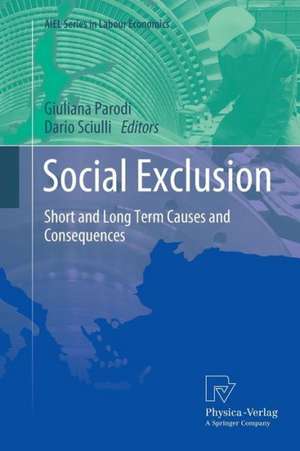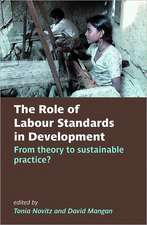Social Exclusion: Short and Long Term Causes and Consequences: AIEL Series in Labour Economics
Editat de Giuliana Parodi, Dario Sciullien Limba Engleză Paperback – 27 noi 2013
| Toate formatele și edițiile | Preț | Express |
|---|---|---|
| Paperback (1) | 639.41 lei 43-57 zile | |
| Physica-Verlag HD – 27 noi 2013 | 639.41 lei 43-57 zile | |
| Hardback (1) | 645.60 lei 43-57 zile | |
| Physica-Verlag HD – 27 sep 2011 | 645.60 lei 43-57 zile |
Preț: 639.41 lei
Preț vechi: 752.24 lei
-15% Nou
Puncte Express: 959
Preț estimativ în valută:
122.39€ • 132.99$ • 102.87£
122.39€ • 132.99$ • 102.87£
Carte tipărită la comandă
Livrare economică 21 aprilie-05 mai
Preluare comenzi: 021 569.72.76
Specificații
ISBN-13: 9783790828412
ISBN-10: 3790828416
Pagini: 276
Ilustrații: X, 266 p.
Dimensiuni: 155 x 235 x 14 mm
Greutate: 0.39 kg
Ediția:2012
Editura: Physica-Verlag HD
Colecția Physica
Seria AIEL Series in Labour Economics
Locul publicării:Heidelberg, Germany
ISBN-10: 3790828416
Pagini: 276
Ilustrații: X, 266 p.
Dimensiuni: 155 x 235 x 14 mm
Greutate: 0.39 kg
Ediția:2012
Editura: Physica-Verlag HD
Colecția Physica
Seria AIEL Series in Labour Economics
Locul publicării:Heidelberg, Germany
Public țintă
ResearchCuprins
The structural and long term causes of social exclusion .- Groups structurally vulnerable to social exclusion .- Economic crisis, labour markets and social exclusion.
Notă biografică
Giuliana Parodi (Ph.D. York 1985) is professor of economic policy at the Faculty of Managerial Sciences, Università d’Annunzio, Pescara Chieti, Italy. Her research interests include the economics of disability, labour economics and the economics of e-learning. She was local coordinator of the WEB-ECON project, cofinanced by the European Commission, coordinated by the University of Trier, Germany, 2000-2002. She has co-organized several Conferences on the Economics of Disability. She has acted as referee for Applied Economics. She is a member of AIEL (Associazione Italiana degli Economisti del Lavoro).
Sciulli Dario (Ph.D. Università di Roma Tor Vergata 2006) is assistant professor of economic policy at the Faculty of Managerial Sciences, Università d’Annunzio of Chieti-Pescara, Italy. Visiting positions at the Universidad Carlos III Madrid, University of York and VU University Amsterdam. His research interests include labour economics (unemployment, wage discrimination, labour market of the disadvantaged groups, school-to-work transitions), early life events and later outcomes, economics of disability and policy evaluation. He is a member of the executive committee (2010-2013) of AIEL (Associazione Italiana degli Economisti del Lavoro)
Sciulli Dario (Ph.D. Università di Roma Tor Vergata 2006) is assistant professor of economic policy at the Faculty of Managerial Sciences, Università d’Annunzio of Chieti-Pescara, Italy. Visiting positions at the Universidad Carlos III Madrid, University of York and VU University Amsterdam. His research interests include labour economics (unemployment, wage discrimination, labour market of the disadvantaged groups, school-to-work transitions), early life events and later outcomes, economics of disability and policy evaluation. He is a member of the executive committee (2010-2013) of AIEL (Associazione Italiana degli Economisti del Lavoro)
Textul de pe ultima copertă
The book provides a panoramic approach to social exclusion, with emphasis on structural causes (education, health, accidents) and on short term causes connected with the crisis which started in 2008. The picture emerging, based on econometric analysis, is that the crisis has widened the risk of social exclusion, from the structural groups, like disabled people and formerly convicted people, to other groups, like the young, unemployed, low skilled workers and immigrants, in terms of income, poverty, health, unemployment, transition between occupational statuses, participation, leading to a widening of socio-economic duality. It has also been stressed the relevance of definitions of socio-economic outcomes for the evaluation of the crisis, and their consequences to define interventions to fight socio-economic effects of the economic downturn. The adequacy of welfare policies to cope with social exclusion, especially during a crisis, has been called into question.
Caracteristici
Relevant topic for understanding the contemporary economic situation Covering of a wide variety of disadvantaged groups Variety of applications of sound econometric techniques Includes supplementary material: sn.pub/extras























